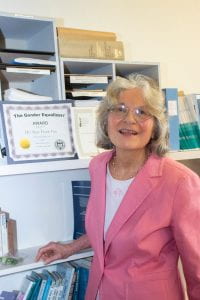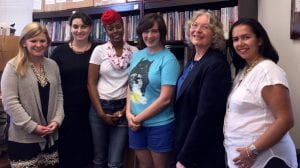Mary Frank Fox is Dean’s Distinguished Professor, School of Public Policy at Georgia Institute of Technology.
She received her Ph.D. in Sociology (1978) at The University of Michigan.
Her research focuses upon gender, science, and academia. Her research has introduced and established ways in which the participation and performance of women and men reflect and are affected by social and organizational features of science and academia. She has addressed these complex processes in a range of research encompassing education and educational programs, collaborative practices, salary rewards, publication productivity, social attributions and expectations, work-family conflict, and dimensions of academic careers. Her publications appear in over 60 different scholarly and scientific journals, books, and collections.
Her current research projects include study of The Transmission Zone Between Producers and Consumers of Knowledge About Women in Science and Engineering, supported by the National Science Foundation (NSF).
Dr. Fox was an original Co-PI of Georgia Tech’s NSF ADVANCE Institutional Transformation grant, and served as Ivan Allen College ADVANCE Professor (2001-2020): A Pioneer of Inclusivity and Equity at Georgia Tech Reflects on 20 Years of ADVANCEs
She was awarded the SWS Feminist Lecturer 2000 (for “prominent feminist scholar who has made a commitment to social change”), and the 2002 WEPAN (Women in Engineering Programs) Betty Vetter Research Award (for “notable achievement in research on women in engineering”). In 2006, she was awarded the Outstanding Faculty Member/Woman of Distinction award, Georgia Institute of Technology. In 2015, Fox received an award as Section Star from the Science, Knowledge, and Technology Section of the American Sociological Association. In 2016, she received the Gender Equity Champion Award, Georgia Institute of Technology, for influential research on gender and science, with significant implications for science and technology policy. In 2017, she received the Distinguished Faculty Researcher Award, Ivan Allen College, Georgia Tech and the Faculty Member of the Year Award, Georgia Tech Student Government Association. In 2024, Fox received an award from the GT Vice President for Research for “Outstanding Achievement in Advancing Diversity, Equity, and Inclusion in Research.” She was also named/honored (2024) as a “History-Making Tech Woman.” Fox was elected as Fellow of the American Association for the Advancement of Science (AAAS) in 2017. In 2020, she was elected Chair of the Social, Economic, and Political Sciences Section of AAAS, and subsequently, appointed member-at-large for the Section.
Georgia Tech Gender Equity Champion Reflects on Role as Pioneer of Gender in Science Studies

Take us back to your time as a student, what was your catalyst for your interest in the studies of gender in science? How did you become a founder in this?
The roots go back to high school — when I did my first study, I was prompted by this question: How does the status of students within the school relate to the status of their families in the community? Using city directories available that contained occupations in households, and doing a ranking of neighborhoods in this small town, I obtained family-household statuses. With help of a teacher, I surveyed the class on the reported social standings of the students at school. I found that the status of students in school and that of their families corresponded more closely for girls than for boys. The boys, it appeared, had an independent avenue for “social mobility” through athletics, which was not available to girls at the time. This opened for me a world of inquiry – one that later, in my research, came to be known as “gender stratification,” social systems of inequality that vary with gender.
I arrived at the University of Michigan as an undergraduate student with a declared sociology major, which was unusual for students in the field. No courses in gender studies were offered at the time. I pursued a “calling” in the study of inequality in occupations, organizations, and societies. I continued in graduate study at the University of Michigan, and -intellectual fireworks!- found a vivid site for study: the case of science, specifically women and men in scientific fields. At the time, no courses or curriculum in the sociology of science existed at Michigan. I went out on a limb- with a focus on science as a strategic, revealing site for the study of gender. In doing this, I was one of the founders of gender and science as a topic. I fostered this as a subject of study, and, in turn, a research area that eventually became part of the national agenda.
Since that period, how has the field evolved? What were some of the most significant moments in the timeline of gender in science studies?
Two key developments occurred.
First is the shift toward a focus upon the way that social contexts (institutions, organizations, societies, cultures) shape experiences and outcomes of women and men. This means that individuals are seen in relation to, not apart from, these settings, and that solutions for equity lie within decisions that are made within organizations.
Second, and related, is a growing awareness that the “pipeline” is a limited and frequently flawed model of progress and attainment of women and men, especially in scientific fields. The pipeline depicts straight lines between education stages and between education and occupational outcomes. The emphasis is on keeping women in the pipeline and correcting deficits (such as one’s personal preferences and decisions) that result in potential “leakage.” The pathways perspective, in contrast, emphasizes progression that is neither direct nor simple, and goes beyond the individual interests, intentions, and choices of women and men to persist. This involves complex considerations of institutional influences, including marriage, family, and households; relations of power that shape competence and success in ways that favor or disfavor some groups; and organizational arrangements that create advantages and disadvantages in interactions, evaluation, and rewards.
What kind of progress is being made currently in gender equity?
Times are both terrific and complex! Progress occurs in gender equity in educational attainments, especially. Challenges exist in continuing to translate education into significant influence and broader participation in institutions and organizations. Meeting the challenge means devoting attention to issues beyond a “pipeline” model.
On that note, what are the biggest current issues that are facing the field?
A challenge lies in taking perspectives on equity and actually implementing them in solutions. For example, in a study undertaken on programs for undergraduate women in science and engineering (Fox, Sonnert, and Nikiforiva, 2009, 2011), we found that directors of these programs did tend to see the issues and problems as structural and institutional, including issues pertaining to classroom climate. However, the typical activities that programs undertake fail to align with their definitions of the problem. Circumstances appear to compel programs to do what they think is “feasible”, expedient, and without challenge to the status-quo, and many programmatic efforts fail to meet the mark.

What is the next big issue that needs to be tackled? Where do you see the future of gender studies heading?
The future includes inquiries into industries such as media, finance, and technology – areas in which it has been difficult to obtain access and data, and areas in which much remains to be understood about women and men in occupations and organizations.
What classes do you teach that might appeal to students interested in the field?
In my class in the study of “Organizations and Policy,” students come to understand that life occurs within organizations: we are born in organizations; obtain food, education, transportation, financial services, health care, and religious community through organizations; and, largely, we are employed in organizations. In order to be effective, we need to understand organizations, the processes that occur within them (how and why they occur), and the external forces that shape and modify organizations. Students come out of the course comprehending these issues.
My graduate class on “Scientific Careers and Workplaces” is a seminar, drawing students from across campus. We focus on supply and demand in the science and engineering workforce; training and experiences of undergraduate, graduate, and post-doctoral students; key features (organizational priorities, structures, cultures) of academic, government, and industrial work settings; and changes, transformations, and futures in workforces and workplaces.
What’s different or important about the way students today perceive issues of gender equality compared to when you started in the field?
Students today see more readily the way that range of participation enhances innovation; that bias reduces human potential; and that conditions of greater equity benefit all. Georgia Tech students do this!
How do you define the way that you work? What motivates you?
C. Wright Mills, a famous sociologist, said it is a choice of how to live, rather than how to work — and that rings true. The pursuit for me is one of endlessly interesting questions, discoveries, understandings, and implications for policies and practices that improve equity. Pursing these is a wondrous opportunity!
